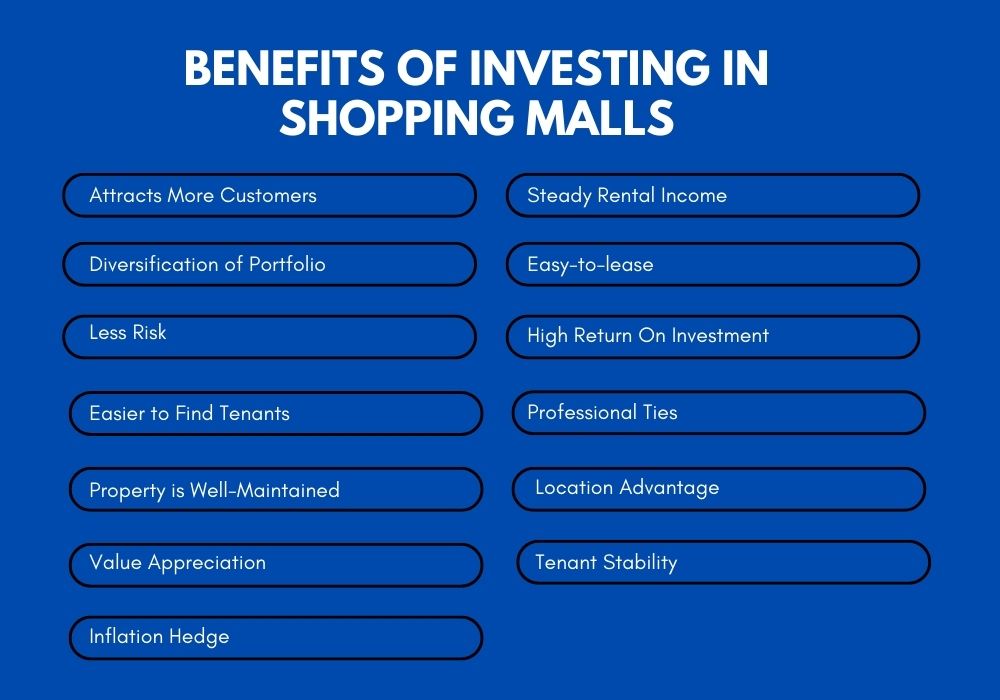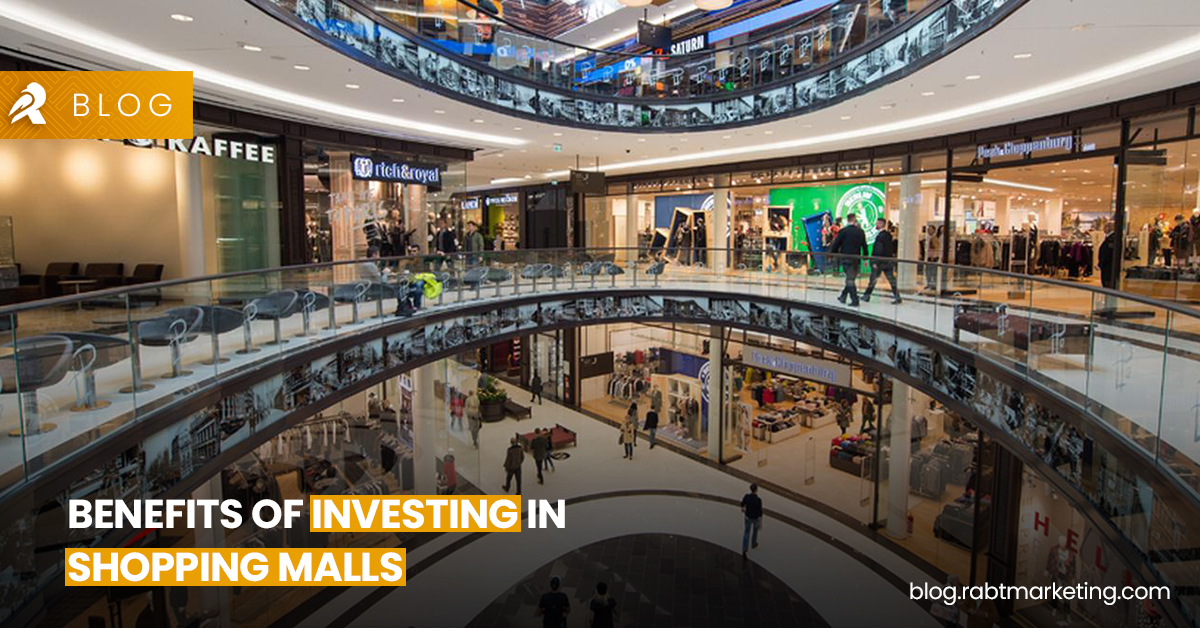Shopping malls have historically outperformed many other types of real estate ventures. In fact, studies show that shopping malls have generated a more annual return as compared to office buildings and apartments. This is due in part to the fact that shopping malls are a relatively stable investment. People will always need to buy goods and services, and shopping malls provide a convenient one-stop shop for doing so. If you are looking for a safe and high-return investment opportunity, shopping malls may be a good option for you. This is because the benefits of investing in shopping malls are greater than any other investment.
However, it is important to note that shopping malls are not without their risks. The increase in online shopping has led to a decline in foot traffic at some malls, which is likely to continue. Make sure to consider the location of the mall, the tenant mix, and the overall bene investing in real estate.
Benefits of Investing in Shopping Malls

Investing in shopping malls can offer a range of benefits for investors. Here are some potential advantages:
Attracts More Customers

Shopping malls offer a convenient and enjoyable shopping experience which is why they are so popular. They are easily accessible because they are usually located in convenient areas with plenty of parking. People visit shopping malls because they can find various stores in one place, saving them time and effort. They can also find food and entertainment at shopping malls, making them a one-stop destination for all their needs.
Another reason most people visit shopping malls is that they are considered more secure than other stores because they have security guards and cameras that constantly monitor the premises. In addition, shopping malls often have events and activities that attract people, such as concerts, movie screenings, and holiday celebrations. This makes them a popular place to socialize and spend time with friends and family.
Steady Rental Income

When you invest in shopping malls, your money is predictable and stable. Unlike other types of real estate, like houses, people rent, where the income can change a lot if renters move out. This is because of the agreements made with the tenants. These agreements last for a long time, so the money you get from rent keeps coming in regularly. This stable income is like a strong foundation for people who invest, helping them feel more secure even if the market or the economy goes up and down. Since many people keep going to these malls to shop, the stores want to stay, so they keep paying rent. This makes sure the money you earn from the mall stays steady and reliable.
Diversification of Portfolio

Diversification means spreading out your investments to make them safer. Investing in shopping malls is a good way to do this. Instead of relying on just one store or type of business, malls have many different kinds of shops, restaurants, and fun places. This mix helps lower the risk of losing money if one type of business has problems.
Shopping mall investments offer a way to diversify your investment portfolio. They are not solely dependent on one tenant or industry, as malls typically house a variety of retailers, restaurants, entertainment venues, and even service providers. This diversification can help reduce risks associated with fluctuations in specific sectors.
Easy-to-lease

Leasing commercial properties, such as shopping malls and retail outlets, is relatively straightforward. The government is quite accommodating when it comes to leasing to investors. Commercial real estate investment options have lower security deposit limits and termination rules than other real estate investment options.
Less Risk

All investments come with some level of risk. It is impossible to eliminate the risk altogether. However, we can reduce the risk associated with real estate investing by using sound strategies and making well-informed decisions.
The risk is low in a shopping mall because it is a shared risk. When you buy a house, you are solely responsible for the risks involved. This is not the case in shopping malls, which are public spaces. In a shopping mall, the risk of something going wrong is spread out over many people. For example, if there is a fire, the damage will be shared by all of the businesses in the mall. This is in contrast to a house, where the owner is responsible for all the costs associated with any damage.
High Return On Investment

A shopping mall in a prime location with excellent infrastructure can generate more revenue than any residential property investment. It is a great real estate business idea with the potential to generate a lot of money quickly.
In addition to the high return on investment, the value of commercial properties increases over time. If commercial properties are properly maintained and cared for, they will increase in value. Moreover, if the area has a variety of housing projects and developments, the value will increase over time.
Easier to Find Tenants

Finding a tenant for a commercial property is much easier than finding a residential one. This is because the shopping mall management takes care of the advertising, tenant screening, and contracts. This means that you will not have to do as much work. Additionally, shopping malls are typically dominated by well-known local and international brands owned by large corporations rather than individual tenants.
The demand for Shopping Malls Evolves with time. The products sold in a store reflect the lifestyle trends of the area it is located in. A commercial shopping mall is likely to have a variety of stores selling different products. As the trend of one-stop shopping grows, people are more attracted to stores and websites that offer a wide range of products. As a result, the importance of such commercial complexes is growing in the eyes of real estate investors, builders, developers, and investment magnates. The increased demand is encouraging builders and developers to construct new shopping malls and plazas in Pakistan to meet the population’s shopping and investment needs.
Professional Ties

Shopping mall investment can be a great opportunity to network with like-minded people if you are an investor who values strong professional relationships. Commercial property owners are typically large corporations and business owners. Unlike residential property owners, they place a high value on B2B relationships, which are built on professionalism and courtesy.
Property is Well-Maintained

Residential tenants are more likely to damage property than commercial tenants. They break things and do not clean up after themselves. This is because they are not as invested in the property as commercial tenants are. Commercial tenants, on the other hand, have a vested interest in keeping the property clean and well-maintained because it affects their business. A clean and well-maintained property will attract more customers and lead to higher sales.
Location Advantage

Prime shopping malls are carefully placed in important areas where lots of people go, like busy neighborhoods or places with many businesses. This helps the mall’s stores and the people who invest in the mall to do well. Being in a good location means many people visit, which is good for the stores in the mall and the people who own the mall.
Value Appreciation

Well-managed shopping malls in desirable locations have the potential for property value appreciation over time. This is because as the surrounding area develops and becomes more popular, the value of the mall property can increase. This is due to a number of factors, including increased demand for retail space, rising property values in the area, and the potential for increased rent from tenants. As a result, investors who own shopping malls in desirable locations can potentially see significant capital gains over time.
Tenant Stability
![]()
Major shopping malls tend to attract reputable and established retail brands, which adds to the stability of the tenant base. Recognizable brands are more likely to uphold their lease agreements, reducing the risk of vacancies and ensuring a steady rental income.
Big shopping malls usually attract well-known and established retail brands. These famous brands are more likely to stick to their rental agreements, which helps prevent empty spaces in the mall and ensures a steady flow of rent.
Inflation Hedge

Real estate investments, such as shopping malls, can help protect your money from inflation. Rental incomes and property values often have the potential to increase in line with inflation, helping to maintain the purchasing power of your investment. When inflation occurs, the prices of goods and services increase. This means that your money will not be able to buy as much as it used to. However, if you invest in real estate, the rental income and property value may increase, which will help to offset the effects of inflation. Additionally, real estate can be a good investment in the long term. Real estate value has historically trended upwards, so you may be able to sell your investment for a profit in the future.
Risks of Investing in Shopping Malls
Investing in shopping malls can offer attractive opportunities for income and capital appreciation, but like any investment, it also comes with its share of risks. Here are some potential risks to consider before investing in shopping malls:
Economic Downturns: Shopping malls are sensitive to economic cycles. During recessions or economic downturns, consumer spending tends to decrease, which can lead to lower tenant sales and higher vacancy rates within the mall. This can impact rental income and the overall value of the investment.
Tenant Risk: The success of a shopping mall heavily relies on the quality and diversity of its tenants. If major anchor tenants or key retailers go out of business or decide not to renew their leases, it can lead to higher vacancies and decreased foot traffic.
Changing Retail Landscape: The rise of e-commerce has disrupted the traditional retail landscape. As more consumers shift to online shopping, malls may face declining foot traffic and tenant sales.
Location and Demographics: The success of a shopping mall is closely tied to its location and the demographic profile of the surrounding population. Changes in population demographics, urban development, or shifts in transportation patterns can influence the mall’s attractiveness to shoppers and tenants.
Maintenance and Renovation Costs: Shopping malls require ongoing maintenance, renovations, and upgrades to keep them appealing to shoppers. These costs can be substantial and impact the overall return on investment.
Lease Expirations and Rent Negotiations: Lease expirations provide opportunities for tenants to renegotiate their rents. If market conditions are unfavorable, it could lead to lower rental income for the property owner.
Security and Safety Concerns: Ensuring the safety and security of shoppers, tenants, and employees is crucial for the success of a shopping mall. Incidents such as accidents, crime, or natural disasters can damage the mall’s reputation and lead to legal liabilities.
Conclusion
Investing in shopping malls offers a range of financial and strategic advantages. It can provide a reliable income stream, diversification, potential for property appreciation, and an opportunity to participate in a dynamic and evolving real estate market sector. As with any investment, thorough research, due diligence, and an understanding market trends are essential to making informed decisions and maximizing returns.

